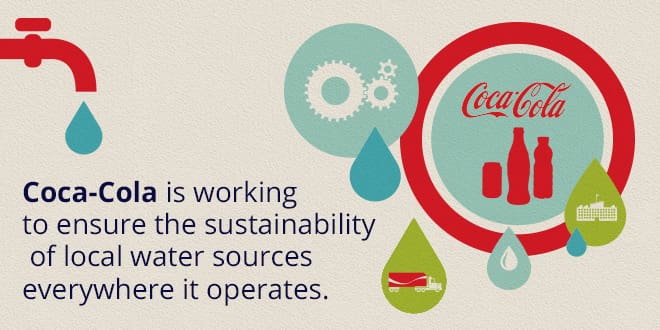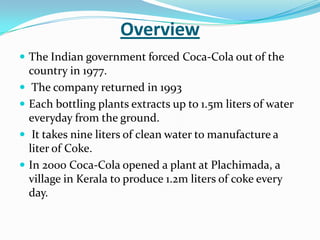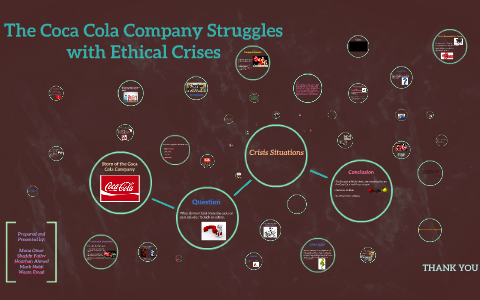Coca-Cola is a global beverage company with a long history and a well-known brand. As with any large corporation, ethical practices are an important part of how the company operates and is perceived by the public. In this essay, we will examine some of the ethical practices of Coca-Cola, including its efforts to promote sustainability and social responsibility, as well as some of the challenges and controversies it has faced.
One of the key ethical practices of Coca-Cola is its commitment to sustainability. The company has set a number of ambitious goals for reducing its environmental impact, including a goal to become "water neutral" by 2020, meaning that it will replenish the same amount of water that it uses in its operations and in the production of its beverages. In addition to its water conservation efforts, Coca-Cola has also set goals to reduce its greenhouse gas emissions and to use more renewable energy sources in its operations.
Another important ethical practice of Coca-Cola is its focus on social responsibility. The company has a number of initiatives designed to support communities around the world, including programs to promote education, healthcare, and economic development. For example, the Coca-Cola Africa Foundation works to improve access to clean water and sanitation in Africa, and the Coca-Cola Company has also partnered with organizations like UNICEF to support disaster relief efforts around the world.
Despite its efforts to promote sustainability and social responsibility, Coca-Cola has faced a number of challenges and controversies related to its ethical practices. One of the most significant issues has been its environmental impact, particularly with regard to water use and waste. In some areas, the company has been accused of depleting local water supplies and contributing to water pollution. In response, Coca-Cola has implemented a number of measures to reduce its water use and improve its water management practices.
Another issue that has been raised about the ethical practices of Coca-Cola is the impact of its products on public health. Some studies have suggested that sugary beverages like Coca-Cola may contribute to obesity and other health problems, and the company has faced criticism for marketing its products to children and teens. In response, Coca-Cola has taken steps to improve the nutritional content of some of its products and to promote healthy lifestyle choices.
In conclusion, while Coca-Cola has made significant efforts to promote sustainability and social responsibility, the company has also faced a number of challenges and controversies related to its ethical practices. As with any large corporation, there will always be room for improvement, and it is important for the company to continue to be transparent and accountable in its efforts to operate ethically.
The Coca

PepsiCo lists various issues relating to government and supplier conduct such as bribery, corruption, money laundering, political activities, and business gifts. In Poland the products had mould. They also were accused of un-lawful marketing and distribution policies by other companies producing a probe by the governent, which found wrong doing by Coke. As for dealing with customers, suppliers and consumers, no employee of Coca-Cola should engage in any activity that inappropriately gives the company advantages. Therefore, they will not face threats of cancellation of its license or fines related to disclosure or integrity acknowledgement.
Case Study: Analysis of the Ethical Behavior of Coca Cola

According to ethical practices in the business world, all employees should be treated equally irrespective of their race, religion, sexuality or gender Massotte, 2017. Therefore by following ethical guidelines and timely reporting and documentation of possible ethical conflicts Coke can eliminate the loss of money and productive time by thinking ahead and following ethical norms and educating their employees to identify and stay away from unethical behavior. Mergers and acquisitions have been seen as consolidation of companies. Coca-Colas strong emphasis on reputation they have created loyalty, trust among their customers, and the strongest brand recognition of all time. Compliance ensures that a company is able to compete appropriately as an equal player to its rivals. French brand Mecca Cola and British brand Qibla Cola, popular in the Middle East, are competitors to Coca-Cola. PepsiCo global code of conduct.
(DOC) Analysis of the Ethical Behavior of Coca

The most dominant products distributed by Coca-cola are Coke, Fanta, Sprite and Diet Coke. The Indian operations comprises of 50 bottling operations, 25 owned by the Company, with another 25 being owned by franchisees. Ever since, Coca-Cola India has made significant investments to build and continually consolidate its business in the country, including new production facilities, waste water treatment plants, distribution systems, and marketing channels. In addition, the firm was in 2001 accused by African American for racial discrimination in terms of pay, performance evaluation, and promotions. Coca-Cola Weaknesses — Internal Strategic Factors Aggressive competition with Pepsi — Pepsi is the biggest rival of Coca-Cola.
Company Policies, Practices & Reports

So, multinationals like Coke, who have an elaborate and descriptive code of ethics are rarely seen to follow it. Signature and Acknowledgement All new employees are made to sign an acknowledgement form confirming that they have read the Code of Business Conduct and agree to abide by its provisions. In little more than a decade Coke has launched more than 300 non-cola drinks in 200 different countries, including dozens of waters. They should allow for solidarity, and respect for human dignity. This caused a loss of reputation, which, in turn, made people lose respect for the company and investors started selling their stocks in Coca-Cola. Fifteen hundred African American employees sued Coca-Cola for Problems with the Burger King Market Test Just three years after the racial discrimination lawsuit, Coca-Cola found themselves in another allegation. Coca-Cola is committed to local markets, paying attention to what people from different cultures and backgrounds like to drink, and where and how they want to drink it.








